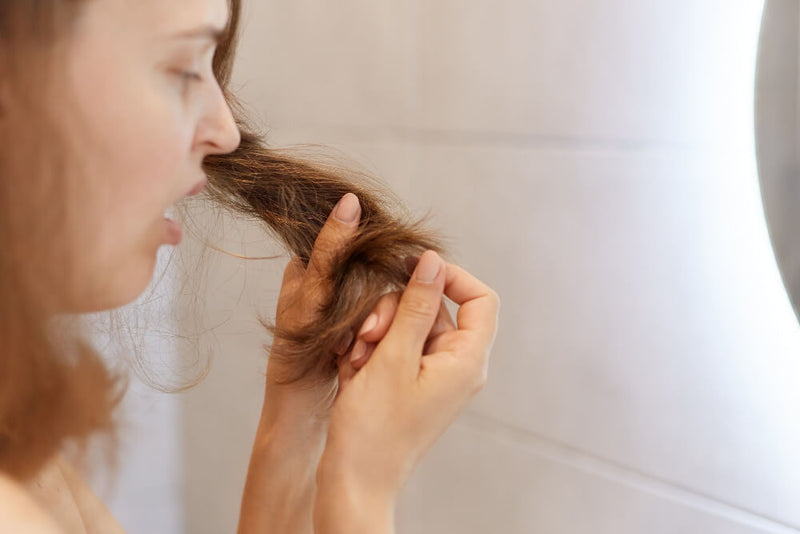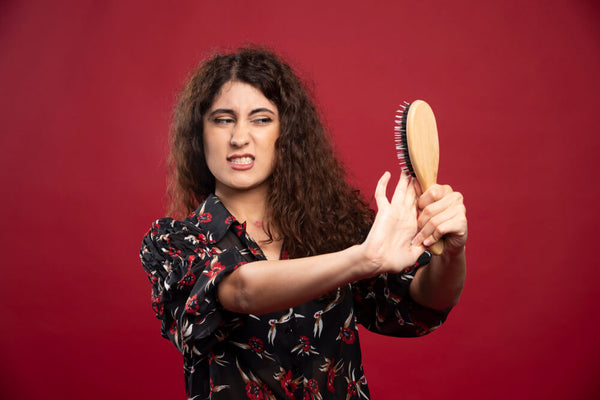You're doing all the things. You're eating your greens, maybe you even use iodized salt. But your hair? It's still lackluster, still thinning, still not growing like it should. It feels like a mystery you can't solve.
What if the clue was in a mineral we all assume we get enough of? Let's talk about iodine. Most of us think "thyroid" and then "salt," but the story of how iodine affects your hair is so much more complex—and so much more important for black women dealing with stubborn hair loss.
Iodine & Your Hair: The Real Story Isn't What You Think
First, let's get one thing straight. Iodine isn't a hair growth serum. You can't just rub it on your scalp or take a supplement and expect miracles.
Iodine is a master regulator. Its main job is to help your thyroid gland produce hormones. And those thyroid hormones? They control your metabolism, your energy, your body temperature… and your hair growth cycle.
Think of your thyroid as the conductor of your body's orchestra. When the conductor has the right tools (iodine), the music plays perfectly, and your hair grows in a healthy, steady rhythm. But if the conductor is missing the baton (iodine deficiency) or has too many (iodine excess), the music falls apart. Your hair growth cycle gets disrupted, and that's when the shedding starts.
This is why just grabbing an iodine supplement off the shelf is a dangerous game. Too little can cause problems, but so can too much.
How Do You Know If Iodine Is Your Problem?
Your body is pretty good at sending signals. The trick is learning how to listen to them. A struggling thyroid often whispers before it screams.
Beyond hair loss, have you noticed any of these?
-
Your energy hit a wall—and never came back
-
You feel cold all the time, even when others are comfortable
-
Your skin is drier than usual and your hair feels like straw
-
You're dealing with brain fog or memory lapses
-
You've gained weight without a clear reason
See, hair loss is rarely a lone wolf. It runs with a pack of other symptoms. That persistent fatigue and those brittle nails aren't separate issues—they're clues pointing to the same root cause.
And for us as Black women, the standard thyroid tests sometimes miss the mark. We can have "normal" levels on paper but still feel terrible because our bodies need a different, more optimal level to function at their best. This is the gap in conventional medicine we bridge every day.
The Right Way to Fix Iodine-Related Hair Loss
So you read the symptoms and you're nodding your head. What now? Please, do not run out and buy iodine supplements. Self-prescribing can backfire, pushing a sluggish thyroid into overdrive or making other conditions worse.
The only path to a real solution is through precision.
1. Test, Don't Guess
At Nina Ross Hair Therapy, we start with advanced lab testing. We don't just look at standard thyroid markers. We run a full thyroid panel to see the entire picture. We can also check your iodine levels to see if you're deficient, sufficient, or in excess. This data is our roadmap.
2. Food First, But Smartly
You can support your iodine levels with diet. Think seafood like cod and shrimp, seaweed, dairy and eggs. But the key is balance. If you have Hashimoto's (an autoimmune thyroid condition), a huge surge of iodine from supplements or seaweed can actually trigger a flare-up. This is where personalized guidance is non-negotiable.
3. Address the Whole System
Iodine doesn't work alone. It needs allies like selenium and zinc to do its job properly and safely. Our approach is to never look at one nutrient in isolation. We create a holistic protocol that may include medical-grade nutraceuticals, dietary shifts, and gut healing to ensure your body can actually use the nutrients you give it.
Ready to Stop Guessing and Start Healing?
If you're tired of the fatigue, the brain fog and watching your hair thin without a clear answer, it's time to look deeper. Your body is trying to tell you something. Book your Hair Therapy Evaluation for just $99 and let us help you listen.
We become your health detectives. We'll connect the dots between your symptoms, your lab results, and your lifestyle to create a plan that doesn't just put a band-aid on the hair loss, but actually recalibrates your body from the inside out.














